Our Vacation in India
Agra
This train, like the first two we took, also did not have first class, so we were once again in 2AC, in a compartment meant to hold four people, then a curtain for the aisle, then a curtain and two people on the other side of the aisle.
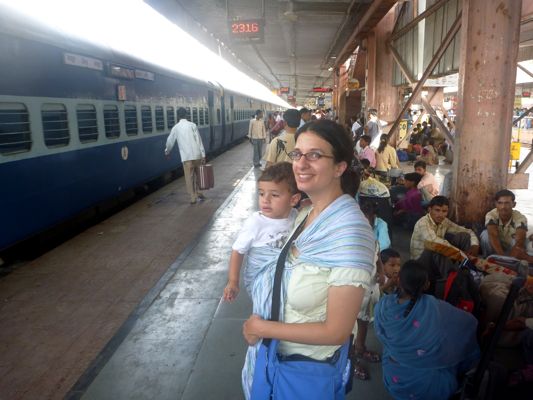 Left and below: Ananya Express train, second class AC/two-tier AC
Left and below: Ananya Express train, second class AC/two-tier AC
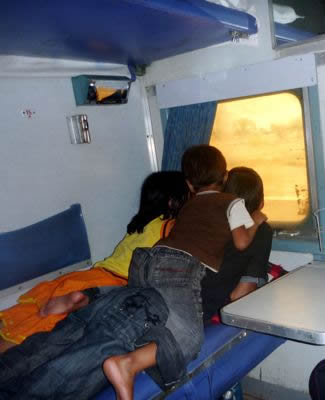
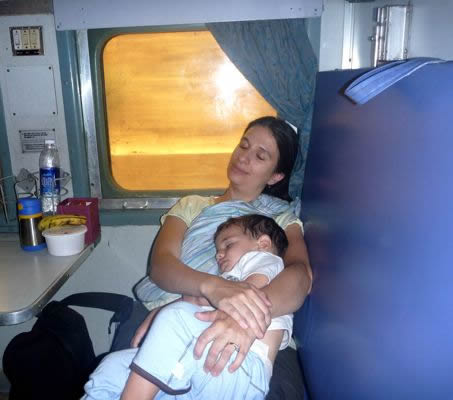
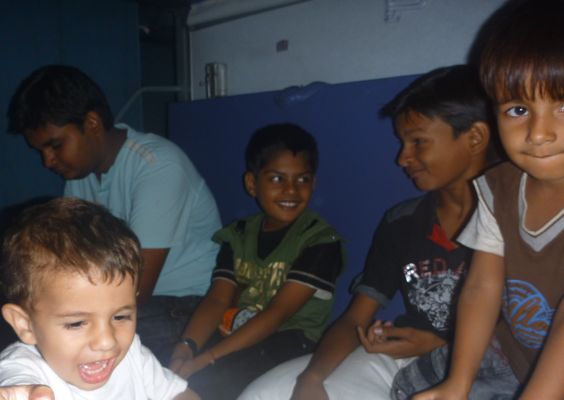
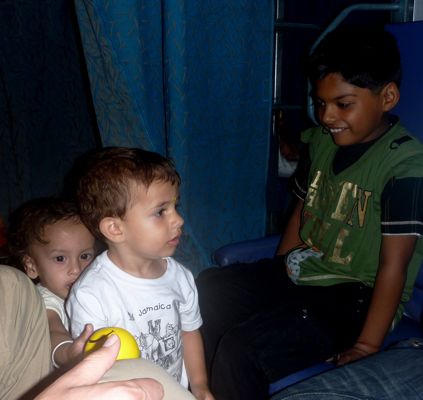
Our compartment at first just had us and a middle-aged man across from us. The man had almost no English, but kept trying, nevertheless, to have a conversation with us. Eventually I noticed that there was a nine-year-old boy sitting on the top bunk over the man (apparently the boy’s family, in another compartment, had suggested he go in here and get some sleep on an empty top bunk), just sitting there smiling. “Uh, do you by chance speak English?” I asked the boy, weary of this painful conversation with the man. “Yes,” he said cheerfully, “I speak English. I go to an English-speaking school.” Wonderful! He started translating for the man and helping us speak to him, and things became much easier.
Soon, though the conductor kicked the man out into another compartment—people were forever being summarily moved about, it seemed—leaving us with just Naman, the nine-year-old who became our fast friend and best informant. Other kids gravitated to our lively compartment, since almost the whole rest of the train just wanted to sleep, and at once point we had seven kids plus one of their twenty-year-old aunts in our compartment: Naman; a six year old girl and her fifteen-month-old brother (the baby was Sikh, so had an adorable beginning of a ponytail with baby wisps floating down) and their aunt, who was supposed to look after them while their mother slept elsewhere; and a three-year-old girl, her ten-year-old brother, their eight-year-old girl cousin, and the ten-year-old’s fourteen-year-old brother with his cellphone. It was so much fun—Naman and the aunt had the most English, but since the aunt kept running off when the baby wandered away, Naman was our constant presence. We asked him all sorts of questions—why are we stopping here, what building is that outside, what crops are they growing out there, what subjects do you take in school—and when he didn’t know the answer he would confer in Hindi with the other children, then leap down and ask adults in other compartments, then come back and report in English. The other kids were shy at first but grew bolder and bolder. Eventually Naman and the ten-year-old boy (who spoke almost no English) were carting Marcus around, and touching his cheeks. “I want a baby brother,” said Naman, “Baby’s cheeks are so so soft!” There were games of ball, lots of stickers, shared potato chips, walks down the car, and conversations about Choki Dhani, where all the kids—all from Jaipur—had of course been and loved.
At 4:30, half an hour late (our first delayed train), we pulled into Agra Fort. We got off, but all our friends stayed on for later stations, so we waved lots of goodbyes to all the kids.
The hotel (Amarvilas, another Oberoi property) car and driver met us at the train station. Oberois do know how to do things right. Once more we had the welcome drink of watermelon juice and a fast check-in in our room—a lovely balcony room on the fourth floor (highest residential floor, so best view) with a view of the Taj. We made arrangements for tomorrow, planning an early guide, and took baths and went to bed early. Marcus and I slept for 10 glorious hours straight through, 7-5; Robert did not sleep well (what’s new there?).
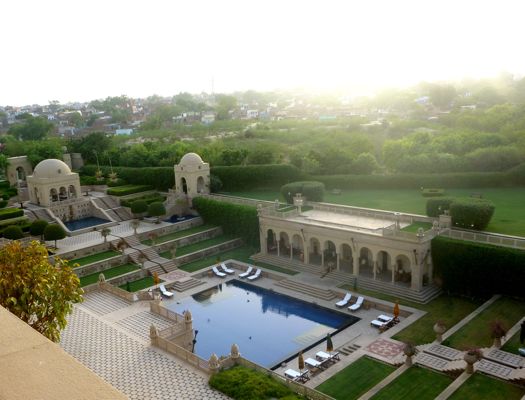
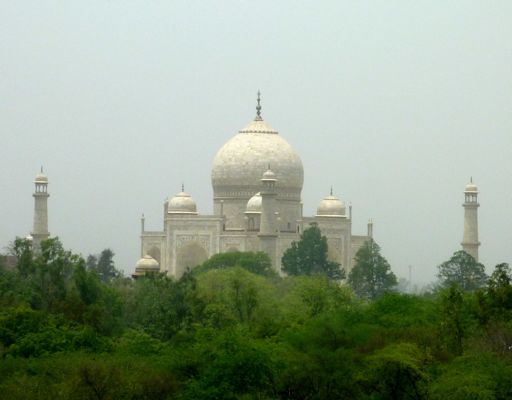
Above: the view from our hotel (pool and grounds, below; Taj, straight out).
At 5:00, we got up, ate the mangoes that had been left for us in our room, and got ready quickly. We had tea and pastries in the lobby and met our guide there at 5:30. The hotel is very close to the entrance gate, but still offers a free golf cart shuttle over—we walked partway and then the golf cart picked us up.
Dawn is a good time to go to the Taj—the marble looks different in different shades of light, of course, but early in the morning things are just much cooler and much less crowded than later in the day. Because a lot of tourists drive down or take the train just for the day from Delhi, big crushes of them arrive around 11:00 and a little later. We hoped to miss all of that, and indeed we did. We hadn’t been fans of the “guides” who loitered around the entrances to various tourist sites, but we figured we should get a real guide to the Taj, so we let the hotel arrange for one. He was fabulous—a native of Agra, a very smart, personable, well-spoken man with perfect English, a master’s degree in Indian history, and a genuine love for the old buildings and sites he showed us around.
We were inside the gates and past security by ten to six. The security was quite odd—there are restrictions on liquids, and bags, and printed material (you cannot bring any books inside, not even a guidebook)—and there were the by now familiar separate lines for men and women, but as was true everywhere in India, they just let Marcus ride through security in the carrier without a second look. It wasn’t too hot out, and it was truly beautiful. At first I’d thought that perhaps we should skip the Taj on this trip—that, well, it was too cliché of a destination, and that it would be overrated, but no, it was definitely worth seeing. We put on the little slipper-socks the hotel gave us over our shoes, and we walked around inside and out and asked questions of our guide. At one point, we saw a family from New Hampshire, with three kids in the 8-12 year-old range. They were the only other white tourists we’d seen with any kids, anywhere in India, and we said hello briefly. At another point, we actually ran into those New Zealanders from Choki Dhani in Jaipur, just as we had jokingly anticipated.
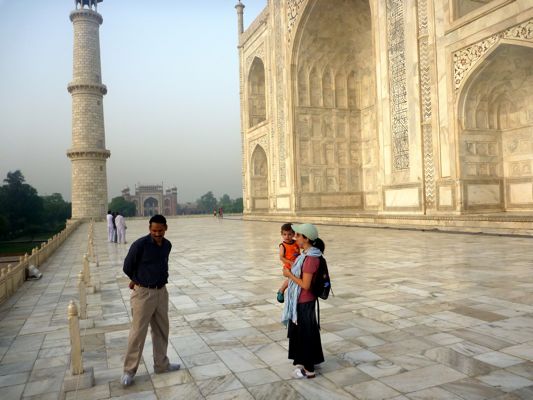
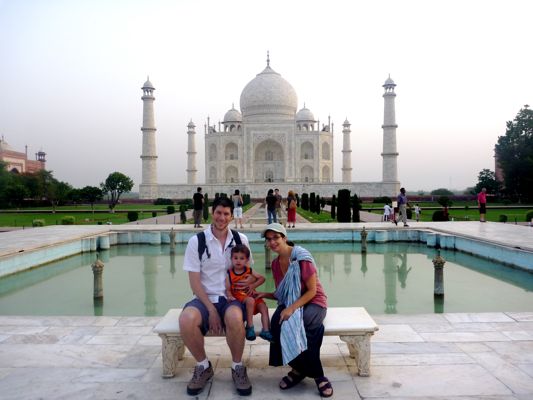
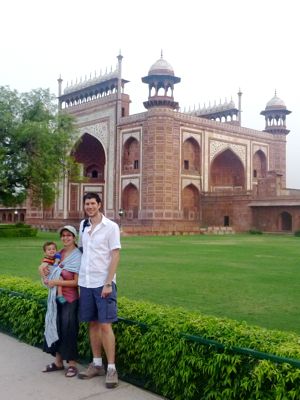
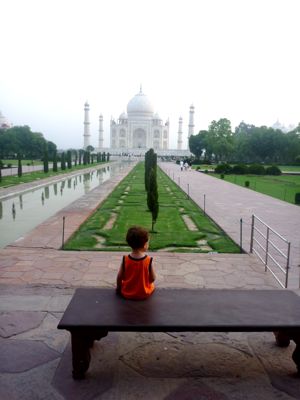
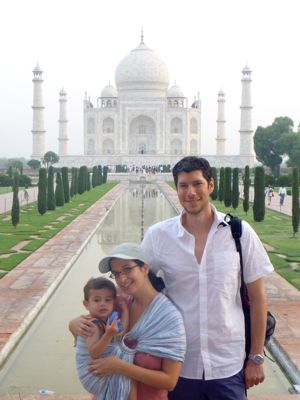
By 7:30 we were back in the hotel having breakfast, which I felt like I would faint without. I ordered my favorite uttapam again, and a mango lassi. Robert asked for something special, not on the menu, and the chef made him a green, lentil-based dosa stuffed with gingery lentils, served with powdered ginger and assorted chutneys. The chef came out to explain it to him, and Robert was thrilled. Our breakfasts came with breads and fruit, like in Udaipur, which were also excellent.
Marcus ate a lot of my uttapam and about half the lassi, mostly while standing next to a baby-sized statue of a king riding an elephant. He kept patting and kissing the statue. I tried not to think too hard about lead paint.
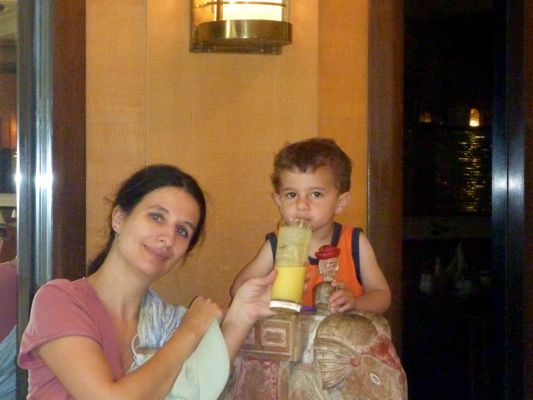
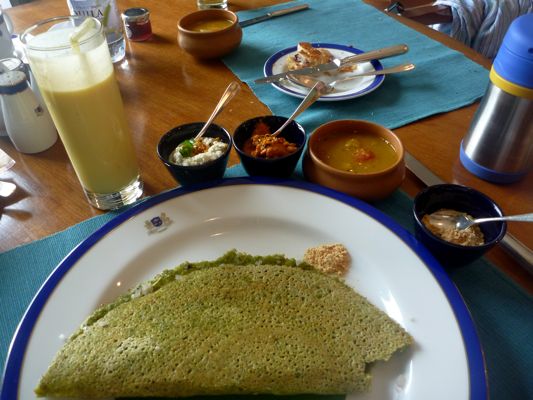
We went back to our room to freshen up and then at 9:00 met our same guide back in the lobby to go to Agra Fort with a car and driver from the hotel. Marcus slept through the fort in the sling, and we had a great tour. I was getting a little warm at this point, as it was getting close to midday. We ran into our New Zealander friends again, and they kept saying how “brave” we were for traveling with baby, who looked angelic and asleep, and not as though we needed to be brave to travel with him at all, at that moment. Marcus coped well with the heat, overall: he carried around his insulated straw-cup of water and sipped from it almost constantly when we were outside. When it was really hot, he just tucked his head in and went to sleep rather than expend energy.
On the way back to the hotel, we stopped at a marble-inlay factory where the descendents of the craftsmen who did all the inlay work on the Taj still practice. The things were beautiful, but we decided we could live without buying something there, although we loved watching the demonstrations.
Our final stop was at the Agra McDonald’s. McDonald’s in other places are always fun to see, and we might actually go to them more predictably than McDonald’s in the US. In Moscow everyone had to get all dressed up in their fanciest jeans for a Saturday night out at McDonald’s, and in Rome we sat at the sidewalk tables (complete with tablecloths) of the Pantheon McDonald’s and looked out at the plaza and listened to live music. Here, we ogled the menu—chicken and vegetarian options were the only things that could please everyone—and ordered the Maharaja Chicken, two chicken burgers, cheese, and special sauce on a bun. It was clearly somehow Indian, yet also clearly McDonald’s.
Below: Agra Fort and a quick McDonald's stop.
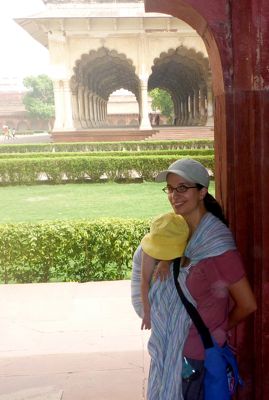
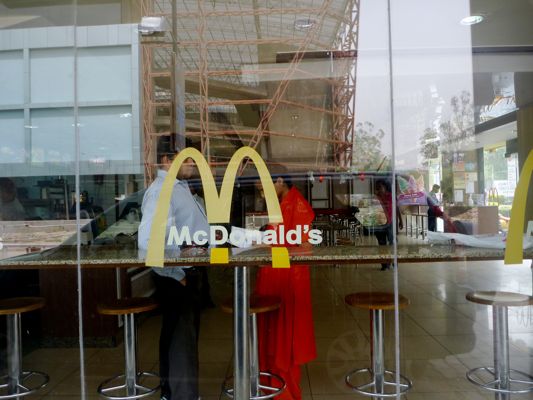
Back at the hotel, we went down to the pool, which was lovely, with a covered, partially indoor end all in the cool shade, as well as an outdoor middle section. Marcus had a great time playing on the steps down and even jumping off the pillars (under the covered section) into our arms. They brought cold washcloths for our face, sunscreen, cold water, and icy fruit skewers with frozen grapes to our lounge chairs while we were swimming, and we only went back up the room because Marcus was getting a little overexcited and somewhat shrieky.
After baths and a nap, we went down for a late lunch at 3:00. We tried the butter chicken and palak paneer—it was truly the best paneer we’d ever had, beautiful squeaky cubes of cheese in a brilliantly green pureed spinach sauce—and the mixed kebob appetizer, which included lamb, chicken, and bekti (a Bengali fish), all of which were fabulous. Back up in the room, we discussed going down to the pool again, when Robert finally admitted that his stomach hurt—a lot—and that it had hurt all day today and all day yesterday.
Robert succumbed to his illness, lying down on the bed and just not moving. We of course traced it back to the “thumb” incident at Choki Dhani, the only thing in the whole trip he ate that I hadn’t. I also reminded Robert how when we were walking around the village there, I used at least four antibacterial hand wipes (“What is wrong with you?” Robert demanded at the time, “You’re offering me those like candy!” and declined to use any himself). Suffice it to say that, yes, he got sick and Marcus and I did not.
We spent the afternoon playing in the room—Legos, coloring, walking out on the balcony, kissing that hideous Indian statue the hotel in Jaipur had given Marcus—while Robert lay on the bed and moaned and clutched his stomach. While Marcus and Robert napped and I wrote and read, I noticed the power outages—power goes out for anywhere from thirty seconds to a couple minutes, even here, in the fanciest hotels. They happen often—two or three times an hour, maybe—and are common in every city we’d been in.
I had started the trip trying to keep track of all of Marcus’s words, but he’d learned so many in the past two weeks that I almost lost count: cow, bull, mooo, dirty, car, door, clock, hello, bag, cookie—he almost learned any new word he wanted to, and though he’d start by repeating after us, he’d use it on his own an hour later and the next day and the day after that.
At 7:00 in the evening, we got everything together and started heading down into the lobby. I figured that, well, if Robert had to be sick, it was good that it was in a comfortable hotel with a very nice bed, a lovely bathroom, great air conditioning, and a beautiful view.
We took the hotel car to the train station (Agra Cantonment) for the train to Delhi. On our way, we passed by another wedding, and we talked to the driver about all the weddings we’d seen in Jaipur. Our driver explained that yes, Indian weddings were a big deal—“small” weddings were 350-400 people, and “large” ones were 2000+, with most being somewhere in the middle. “How big was your wedding?” we asked, and got a curious answer—he is a Christian, he said, so he had a tiny wedding by Indian standards with only 250 people, because the Christian community in Agra is so small. Like our guide, the driver was Agra born and raised, and he talked interestingly about how much the city has been growing and changing over the years.
We got to the station just before 8:00 for our 8:30 train. This was to be our last train ride of the trip and in many ways an outlier: it was the shortest ride, first of all, at just two hours, on the highest-speed train, the Shatabdi Express, which offered just one class—first class AC—on the entire train and had only western-style bathrooms (complete with toilet paper, Robert reported, shocked but, I imagine, pleased). It was very much like a regular Amtrak train back home, with normal seats, all facing in one direction, two then an aisle then another two, and solid air conditioning. This train was positively teeming with white people—we must have seen six or seven of them. Unlike Amtraks, though, the Shatabdi had an attendant for each car, wearing a butler-type uniform, coming around with free bottles of water for everyone and free dinner: Meals on Wheels, it was, veg or non-veg. The dinner was not amazing food, but it was quite decent, and even came with dessert—individual cups of butterscotch ice cream. Marcus slept through dinner and the entire train ride, actually, which was fine, because in many ways it was our most boring train ride yet. If this train had been the only one we’d taken in India, we would definitely have missed out on a lot.
Below: train food (Shatabdi Express--all 1A, first class AC, fancy!)
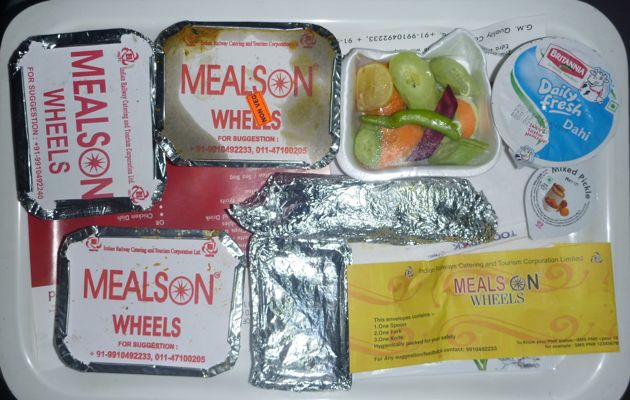
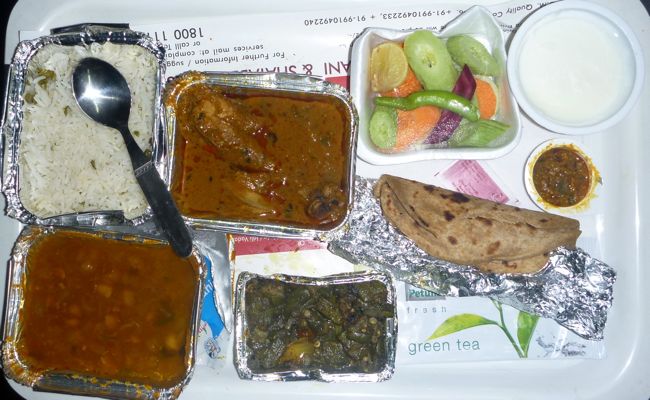
As we got closer to Delhi, I started realizing that our trip was coming near an end, and I started thinking back on it a little. We will definitely come back to India—maybe during the monsoon, because it’s such an important part of life to people. Water is life, and that became very obvious in the reverent way that people talked about the monsoon. Good monsoons make people so happy. Maybe we’ll come back in ten years, when Marcus is eleven, going on twelve. At that point, he’d love everything we did this time, but on another level, and of course he’d also enjoy the wild game parks that we didn’t think we could manage to squeeze into this trip. It would be interesting to see how things change in ten years—people predict there will be more English, more credit card use, etc., but I think cultural attitudes will also change.
For now, I was glad that Marcus is too young to understand the beggar we saw—we hadn’t been inundated with them as I’d heard and feared, but we definitely did see some—a woman with a baby outside the Fort, two kids each missing a leg at the train station. It’s hard to see. Also hard are the people who are hawking things, or the rickshaw drivers who want more money at the end—these people are obviously so, so poor, and twenty-thirty-forty rupees are almost nothing to us, but the hardness of their lives and their outlooks is just head-scratchingly sad. There’s nothing to do, overall, except adopt our best New Yorker poses and keep on walking, if we’re on foot. But if we’re sitting in our air conditioned private car, being handed cold water and fresh cold towels while they still tap on the window with plastic toys and flowers for sale—that’s hard. Marcus just waves back. “Hi!” he says. He can’t really see, and I’m glad. That’s why I think waiting to come back until he’s twelve would be better—when he can understand things a little more.
The children who don’t want anything from you—who just want to stare, play, or maybe use their English—are innocent and the best part in a lot of ways. I’ve loved taking the trains because of them, even though the trains were a lot of stress, particularly on Robert. (He’s more susceptible to physical discomfort/being cramped than I am, even though he actually complains less, and he never rests well, and he’s had to carry our bags up and down stairs and around the obstacle courses of people on platforms and on and off of trains, over and over again). Still, I’ve loved watching and talking to the people, all of them.
It’s interesting, too, thinking about class (caste? yes, but no one ever mentions this) differences, about skin lightness. Everyone here is concerned with skin lightness—several remarked that I could be a fair-skinned Indian—and we’ve seen so many TV ads that promise products that will “reveal your inner fairness” and creams that will “prevent skin darkening.” The darkest people, of course, are the ones doing the worst work, carrying around bags of trash on their back bigger than an overstuffed easy chair, or riding a bike-rickshaw in the heat.
When we arrived at New Delhi station, it was 10:30. The hotel was supposed to meet us, but we couldn’t find the car and driver. We did think that was strange for an Oberoi, but I stayed in one spot with Marcus and the bags while Robert walked up and down and peered around and looked. Nothing, so we moved onto plan B, and looked for a pre-paid taxi line, like at the Mumbai airport. It either didn’t exist, or else it was in the same mysterious and invisible place as the car and driver, so we moved onto plan C, a pre-paid auto rickshaw. I was pretty set on doing the pre-paid ones vs. the sketchy guys who approached you to avoid a scam, but we were concerned about how we would fit with all our luggage in an auto rickshaw. We found the line, though, and got on it, ignoring the annoying, aggressive, slick rickshaw drivers trying to woo us out of the line. A couple people ahead of me on line were very nice and told us yes, we were in the right line and no, they wouldn’t take the sketchy guys’ offers either, and yes, we were doing exactly the right thing.
At the front of the line, you talk to a man in a little booth, tell him your destination, and pay him whatever the computer says. He then prints out a ticket and hands it to you to give to the first driver who’s patiently waiting in a line, and after the driver drops you off he can come back and get payment from the dispatcher guy.
“Oberoi,” I said. “Near Hazrat Nizamuddin.”
“Oberoi?” the man in the booth said. I said yes.
He said it was fifty-two rupees. I gave him two fifties. He rolled his eyes and gave me one back. “Small small,” he said. We love the Indian intolerance for change. He handed me the slip and we went to the first tuk-tuk in line.
What luck! Our tuk-tuk driver spoke not a word of English—really not one word. Clearly, in retrospect, it made sense—that was why he actually waited in the line, instead of standing outside and harassing us.
I handed him the slip and once again said, “Oberoi.”
We all piled in, super crammed, but we made it. He drove through Delhi, which even at this rushed, dark first glance was a drastically different city than Mumbai, with wide, tree-lined streets that almost look like highways cutting through different parts of the city. “It’s like Queens Boulevard,” Robert said.
Finally he stopped and pulled into a driveway and motioned Robert to get out. A sign in front of us, at a gate across the driveway, said “Sunder Nager.” I was pretty sure we were not at the Oberoi, but not sure where we were. Marcus was sleeping in the sling and I was so wedged into the tuk-tuk that I wasn’t getting out for any number of reasons. Robert got out. He and the driver looked at each other, puzzled, until Robert found a guard near the gate who told him the Oberoi was close, but this was not it. He spoke in Hindi to our driver, who eventually seemed to believe him, and reluctantly piled back in and drove us to another driveway a minute or two away. This one was unmarked, but again had a guard and a gate. Robert got out again and spoke with the guard and then motioned me out—yes, this was the Oberoi. It still looked kind of fishy, though. The guard said the tuk tuk couldn’t go in, but we should walk in and then right and uphill and then left. We did, and it soon became obvious that we had entered by the service entrance, but we made our way to the main lobby and through the by-now familiar security to get into the hotel.
In the lobby, no one came to greet us. No one seemed at all helpful, actually, or even mildly concerned. We were annoyed. At the desk, I tried to check in, and the woman all but insisted that we weren’t here. “The driver is at the station, ma’am, waiting for you,” she said. “But we’re here,” Robert said, and explained. “The driver is still waiting, ma’am,” she said again. “Okay, but we’re here,” Robert said, again. Poor Robert—part of him wanted to argue and get our flowers and welcome drink and some sort of discount for our trouble, or a free meal or something, but meanwhile his stomach was still killing him, and after a bouncy ride in the tuk-tuk he clearly did not want to be standing in the lobby arguing with a clerk. “Why did you not call us, sir?” she asked. Once more, we were met with bafflement when we said we didn’t have a cell phone with us. Everyone has cell phones—almost the poorest of the poor do—and here we were, without one. For the record, we’d never seen a public phone, and no one ever thought of suggesting that—that was clearly just as crazy as not having a cell phone at all!
Apparently, the driver was at the Ajmeri exit of the train station, and we had not been. That all sounded perfectly logical, but we had indeed walked up and down the station and asked all the vaguely official people (including a genuinely official military policeman who helped shoo away a particularly persistent tuk-tuk driver) where a car that was waiting for us might be, and we hadn’t seen obvious evidence of another exit. I guess we’ll know for next time, now. The pre-paid tuk-tuk deal also turned out to be logical enough: the dispatcher had just put the name of the neighborhood on the ticket (“Like Forest Hills,” said Robert), and we were apparently supposed to give the driver specific directions from there, but lack of knowledge and lack of communication conspired against us.
In any case, we finally made it up to our room, a nice, businesslike but not amazing room on the eighth floor, at midnight. Marcus was so good—he just nestled down between us in the bed and fell right back to sleep. Robert moaned, still holding his stomach.
I had no idea what day it was, but Marcus and I went to sleep and slept well. In fact, throughout the trip, we noticed that our sense of days and dates disappeared completely. We changed in other ways, too, particularly in our expectations—I think we had both initially expected more, and better, English from the people we came in contact with, but even waiters and drivers at fancy hotels often had extremely limited conversational abilities once we deviated from the typical tourist script. Our answer to the inevitable question, “Where [are you] from?” also changed, as in the beginning I would say “Boston.” Most people would sort of squint at that, and then we’d have to say, “In the US—near New York,” to get recognition. We tried just saying, “The US,” in answer, but then everyone wanted to know which city, and we were right back to the problem of Boston again. Eventually we just settled on saying, “New York,” which felt true enough, and which everyone seemed to like as an answer. We got many thumbs-up signs for it, at least, and, just as when I traveled in Russia 20 years ago (my God, am I that old??), people would approve of our answer and our country: “Very good! Very good!” Some would add, “Like Obama!” or “Like Michael Jackson!” Uh, yeah. Just like Michael Jackson. Robert said he wanted to ask people back where they were from, and when they said “Ahmedabad,” or “Surat,” or “Lucknow,” he wanted to say, “Very good! Very good!” to them, too.